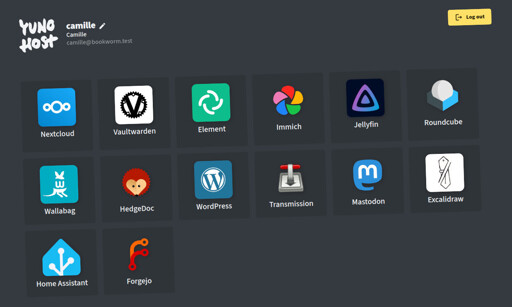- cross-posted to:
- selfhosted@lemmy.world
- selfhosted@lemmy.world
- cross-posted to:
- selfhosted@lemmy.world
- selfhosted@lemmy.world
I recently discovered yunohost, a French project for easy selfhosting. Does anyone have experience with that?
Yunohost is okayish. Some apps sadly are badly maintained and therefore upgraded with more delay than I considered acceptable (but that has improved afaik)and integration into a single “look and feel” is a bit lacking. Nevertheless it’s solid in the end.
If you are willing to pay something Cloudron may be an alternative for you as well - very well maintained product, good support team and rock solid from my experience - and it’s a non-US/non-China company. (German to be exact) But it costs money for more than 2 applications. I nevertheless went with them - I don’t self host as a hobby, I self-host because I want shit to work. Between job and family I have no time to fiddle around with things and keep everything updated on a short notice. I have project where I can do that, but they are not something my family or myself depend on. (And they integrate nicely with Cloudron as you can add “custom” Apps/use it as a proxy and OpenID Provider)
Been using it for 10+ years. Love it.
Umbrel, Cosmos Cloud, Caprover, Yacht, Dokku, there’s a billion of these things.
yunotryityourself?
Big part of me loving selfhosting stuff is that I get to learn things a lot. I think it’s pretty amazing that these sort of projects exist but I’ll always use good ol’
$BASIC_SERVER_OS.Elena Rossini, well known for her help in growing the Fediverse, raves about Yunohost, https://news.elenarossini.com/my-year-of-fediverse-explorations/. You should be fine using it.
Yes, it’s pretty good! I’m a DevOps engineer, and have experience with Ansible, Docker, etc, but I just couldn’t find time to deploy services the best way that I wanted™ for my personal server
So, even though it e.g. doesn’t even use Docker, yunohost really helped me start using the many services I wanted/needed, which otherwise might take e.g. a few hours to a couple of days for each of them to research and configure
So I have one “production” yunohost server, one “testing” yunohost server to test services that I don’t know if I’ll use yet (and I wouldn’t want them to interfere with production e.g. by using too many resources)
and one server without yunohost for mailu, Docker, traefik, etc, which I can use to deploy services the correct way™ as I figure out the services that I really use and find the time to migrate them one-by-one
Even when using yunohost, there are so many things to do after deploying a service (e.g. DNS, configure the server and client software), so it has been really useful to save time when deploying and configuring.
I think it gets you ~80% there, makes self-hosting accessible to everyone, and helps democratize the Internet a bit 💚 It’s more important to have many people setting up e.g. Immich or Nextcloud for their family photos, than only a few Linux people being able to learn how to do it perfectly (Docker/kubernetes high availability, reverse proxies, etc) and have everyone else to need to resort to using centralized services
Elena Rossini (@_elena@mastodon.social) is a journalist who’s gotten into the fediverse and self hosting with Yuno Host. She’s documented it on her blog. It’s worked out really well for her.
And they just boosted https://toot.aquilenet.fr/@yunohost/114431095460107487
Des, it has, what most others lack: Single Sign In and many Apps.
I did some testing with it, because I believe more people should be able to self-host.
I like how it is implemented. It has good support for email. Many apps support SSO.
The critical part to me is how up-to-date applications are. I started a small project to automate version tracking, check out:
https://alexpdp7.github.io/selfhostwatch/app/nextcloud.html
; so for example, the YunoHost Nextcloud app does not lag much behind upstream. My intention with this is to let people see that they have been updating Nextcloud dilligently for two years; they might pull the plug tomorrow, but it’s a good track record.
(I’d like to add scrapers to other projects similar to YunoHost. My ultimate goal would be to be able to choose a list of apps you’d like to self-host, and see which projects like YunoHost carry the applications you want, and compare how they track updates.)
not myself, but my stepdad tried it with 2 decades of IT and linux sysadmin experience.
basically, it is great if you want to host like 2 or 3 standalone services on a pi to get into understanding how the basics of selfhosting work, but for homelabs and deep customization, you’re better off with docker compose on debian/ubuntu server.
I’ve used it when I started out and it’s good, I can recommend it if you just want something where you can hit install and it works. I just use docker containers now though because I have more experience and it allows to set everything up exactly how I want.
Same process here, started with yunojost and now using docker directly. Still Yunohost got me into self-hosting when I didn’t know anything about it, definitely recommended for starting out.
Used for years, then moved into docker containers.
It’s pretty rad, especially as a domain controller.
Nice as a starting point, but not enough features to make it worth it for advanced setups.
Use it everyday. I self host a number of fedi services. It’s a great os.
Most of the apps are great, but there are a couple that are no longer maintained.






